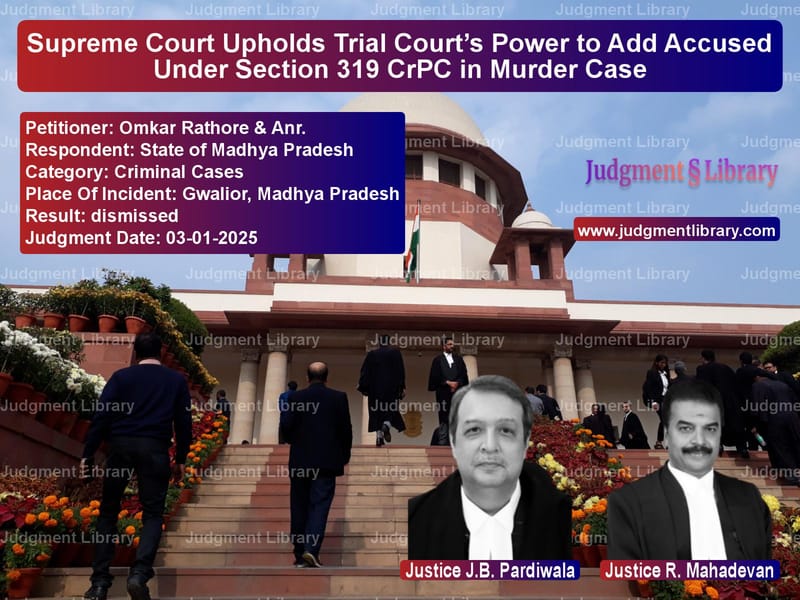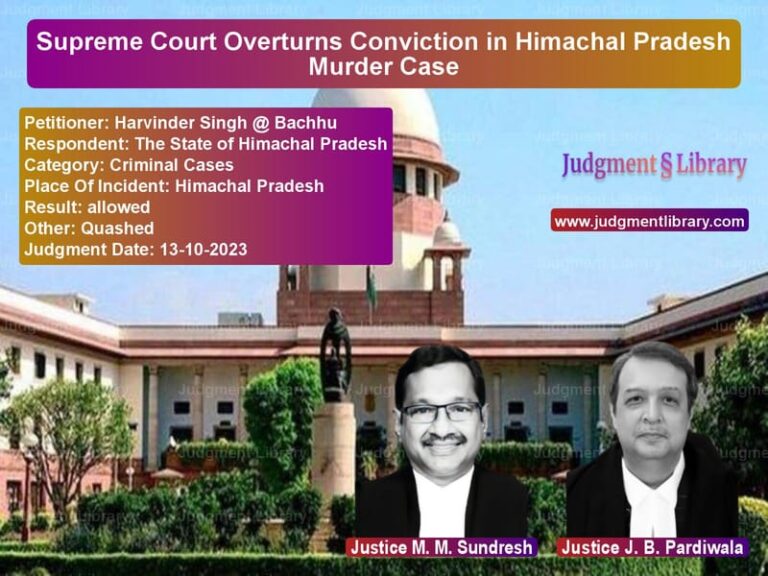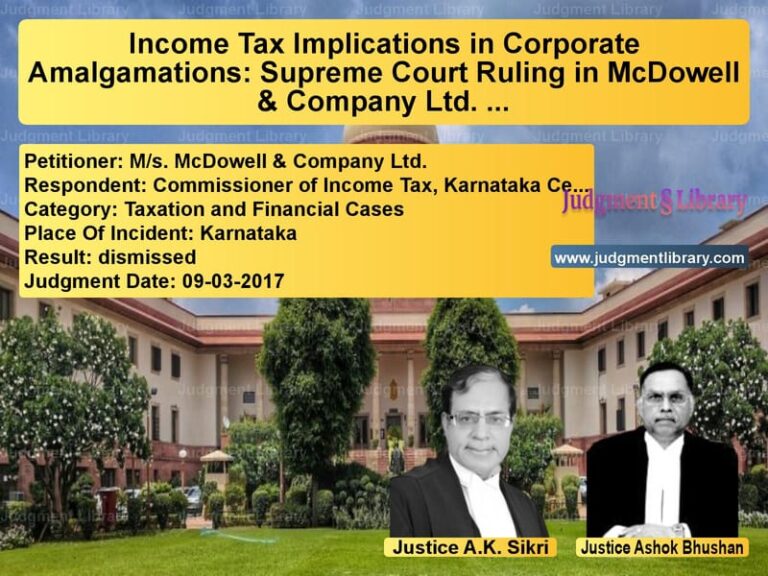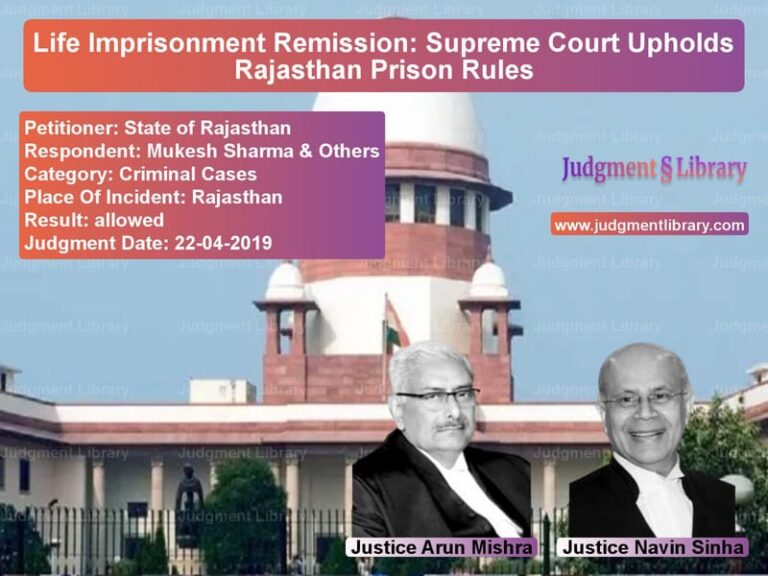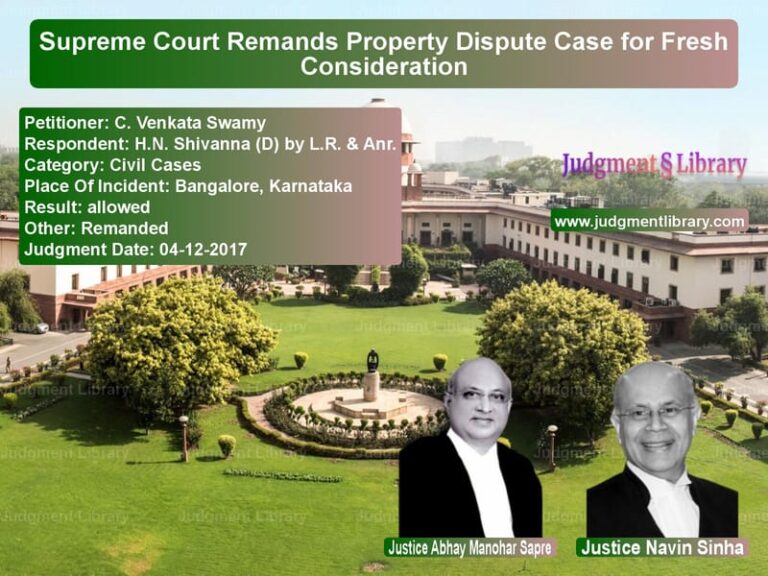Supreme Court Upholds Trial Court’s Power to Add Accused Under Section 319 CrPC in Murder Case
The Supreme Court of India, in the case of Omkar Rathore & Anr. vs. State of Madhya Pradesh, addressed an important issue regarding the powers of the trial court under Section 319 of the Criminal Procedure Code (CrPC) to summon additional accused during ongoing criminal proceedings. The petitioners, in this case, challenged the order passed by the High Court that upheld the trial court’s decision to summon them as accused in a murder case. The case involved serious charges under Section 302 (murder) of the IPC, and the trial court had used its powers under Section 319 CrPC to summon the petitioners, despite the police not naming them in the charge sheet. The Supreme Court dismissed the appeal, thereby reinforcing the scope of Section 319 and the discretion of courts in such matters.
Background of the Case
The petitioners, Omkar Rathore and another, were involved in a murder case where the initial FIR was filed under Sections 302, 307, 147, 148, and 149 of the IPC following an alleged gang-related murder. The FIR named several individuals, including the petitioners. However, after the investigation, the police filed a closure report for the petitioners, stating that there was no sufficient evidence to charge them. Despite this, the complainant (the first informant) did not agree with the closure report and applied to the trial court under Section 319 CrPC to summon the petitioners, claiming that there was enough evidence against them for the commission of murder.
The trial court, after examining the oral evidence and considering the complainant’s statement, agreed to summon the petitioners as accused under Section 319 CrPC, which allows the court to summon persons not named in the charge sheet if the evidence presented during the trial indicates their involvement in the offense. The petitioners challenged this order in the High Court, but the High Court upheld the decision. They then moved the Supreme Court, arguing that the High Court had erred in law by allowing the trial court’s decision.
Petitioner’s Arguments
The petitioners, represented by Senior Counsel A.K. Sharma, put forth the following arguments:
- The trial court had incorrectly exercised its powers under Section 319 CrPC by summoning the petitioners as accused, as there was no clear and cogent evidence against them. The closure report filed by the police should have been given more weight.
- Section 319 CrPC is intended for use only in exceptional cases where the evidence adduced during the trial directly points to the involvement of an individual in the crime.
- The trial court’s reliance on the deposition of the complainant was insufficient and could not be considered strong evidence to invoke Section 319 CrPC.
- The summoning of the petitioners based on untested oral evidence violated their rights under Article 21 of the Constitution, which guarantees a fair trial.
Respondent’s Arguments
The respondent, represented by Advocate Rajesh Kumar, argued in defense of the trial court’s decision, asserting that:
- The trial court had the discretion to invoke Section 319 CrPC to summon the petitioners as accused based on the oral evidence presented during the trial. The complainant’s statement provided sufficient grounds for the court to exercise its powers.
- Under Section 319 CrPC, the trial court is not restricted by the charge sheet but can summon anyone whose involvement is revealed during the trial. This ensures that all guilty parties are brought to justice.
- The High Court correctly upheld the trial court’s decision, as the evidence led during the trial warranted the inclusion of the petitioners as accused in the case.
Supreme Court’s Observations
The Supreme Court Bench, comprising Justices J.B. Pardiwala and R. Mahadevan, examined the legal aspects of Section 319 CrPC and the facts of the case. The Court made the following key observations:
Power Under Section 319 CrPC
“Section 319 CrPC confers an extraordinary and discretionary power on the trial court to summon an individual as an accused even if that person is not named in the charge sheet. However, this power should be exercised with caution and only when there is strong and cogent evidence pointing to the involvement of the individual in the crime.”
Read also: https://judgmentlibrary.com/supreme-court-orders-fresh-consideration-of-bail-in-mcoca-murder-case/
Discretion of the Trial Court
“The trial court, in this case, rightly exercised its discretion under Section 319 CrPC after considering the oral evidence of the complainant, which indicated the petitioners’ involvement in the crime. The Court must consider whether the evidence presented during the trial meets the threshold for summoning additional accused.”
Legal Precedent on Section 319 CrPC
The Court referred to previous rulings on Section 319 CrPC:
- Hardeep Singh v. State of Punjab (2014): The Court had held that the power under Section 319 CrPC must be exercised sparingly and only when the evidence presented during the trial is strong enough to justify the summoning of an accused.
- Ramesh Chandra Srivastava v. State of U.P. (2021): The Court emphasized that Section 319 CrPC cannot be used merely based on assumptions or vague statements but should rely on solid evidence presented during the trial.
Standard of Evidence
“The evidence adduced must be more than just a prima facie case at the time of framing charges. It must be sufficient to indicate that, if unrebutted, it could lead to the conviction of the individual being summoned.”
Final Judgment
The Supreme Court, after considering all arguments, upheld the decision of the High Court. The Court ruled as follows:
- The appeal filed by the petitioners was dismissed.
- The High Court’s decision to uphold the trial court’s order of summoning the petitioners was affirmed.
- The Court emphasized that the trial court had not acted arbitrarily, and the evidence presented during the trial justified the summoning of the petitioners as additional accused under Section 319 CrPC.
Impact of the Judgment
The judgment has important implications for criminal procedure, especially regarding the powers of the trial court to summon additional accused during ongoing trials. The key takeaways from the ruling are:
Read also: https://judgmentlibrary.com/supreme-court-ruling-on-proclaimed-offender-status-and-section-174a-ipc/
- The trial court has the discretion to invoke Section 319 CrPC to add new accused, even if they were not named in the charge sheet, provided strong evidence is presented during the trial.
- The standard of evidence for invoking Section 319 CrPC is higher than a prima facie case and must be sufficient to indicate that the person should face trial.
- The ruling reinforces the principle that judicial discretion under Section 319 CrPC should be exercised cautiously but can be used effectively to ensure justice when necessary evidence emerges during the trial.
Conclusion
The case of Omkar Rathore & Anr. vs. State of Madhya Pradesh reaffirms the importance of the trial court’s discretion in summoning additional accused persons under Section 319 CrPC. The decision sets a significant precedent for how evidence should be evaluated when exercising this power and underscores the importance of strong and cogent evidence in such proceedings.
Petitioner Name: Omkar Rathore & Anr..Respondent Name: State of Madhya Pradesh.Judgment By: Justice J.B. Pardiwala, Justice R. Mahadevan.Place Of Incident: Gwalior, Madhya Pradesh.Judgment Date: 03-01-2025.
Don’t miss out on the full details! Download the complete judgment in PDF format below and gain valuable insights instantly!
Download Judgment: omkar-rathore-&-anr.-vs-state-of-madhya-prad-supreme-court-of-india-judgment-dated-03-01-2025.pdf
Directly Download Judgment: Directly download this Judgment
See all petitions in Murder Cases
See all petitions in Bail and Anticipatory Bail
See all petitions in Fraud and Forgery
See all petitions in Theft and Robbery Cases
See all petitions in Custodial Deaths and Police Misconduct
See all petitions in Judgment by J.B. Pardiwala
See all petitions in Judgment by R. Mahadevan
See all petitions in dismissed
See all petitions in supreme court of India judgments January 2025
See all petitions in 2025 judgments
See all posts in Criminal Cases Category
See all allowed petitions in Criminal Cases Category
See all Dismissed petitions in Criminal Cases Category
See all partially allowed petitions in Criminal Cases Category

